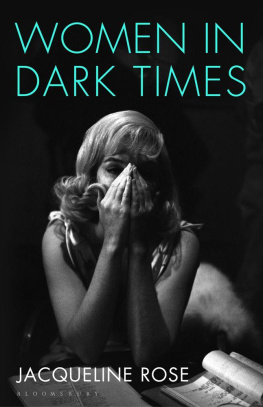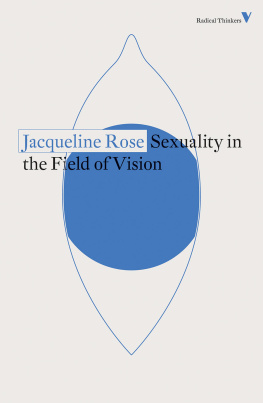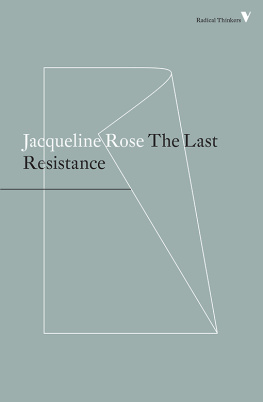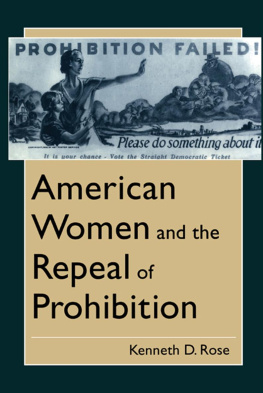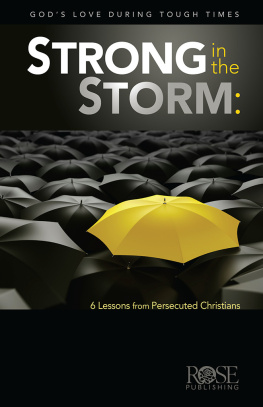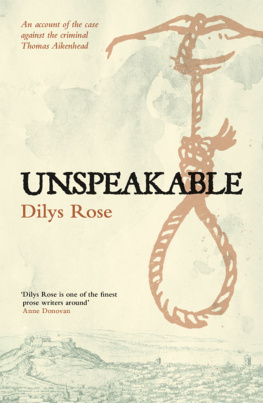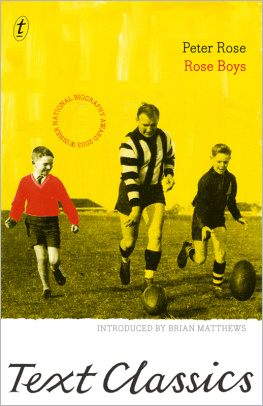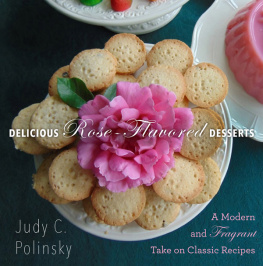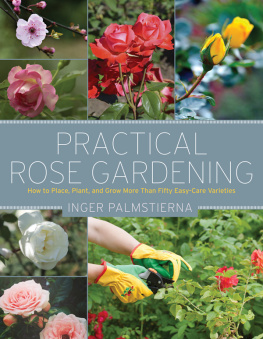
For Mia Rose
Just imagine, it was precisely those bruises on my soul that at the next moment gave me the courage for a new life.
Rosa Luxemburg to Leo Jogiches, 1898
Darkness is a better form of freedom.
Thrse Oulton, in conversation, January 2013
Contents
It is time to return to what feminism has to tell us. It is time to make the case for what women have uniquely to say about the perils of our modern world. The case cannot, however, be made along the lines that have become most familiar. We cannot make it only by asserting womens right to equality or by arguing that women are qualified to enter the courts of judgement and the corridors of power. Those claims are important but they tend to be made loudly, as they must be to the detriment of another type of understanding, less obvious but no less vital, that makes its way into the darker spaces of the world, ripping the cover from the illusions through which the most deadly forms of power sustain and congratulate themselves. This we might call the knowledge of women. In its best forms, it is what allows women to struggle for freedom without being co-opted by false pretension or by the brute exertion of power for its own sake.
I say women but of course I mean some women. No feminism should claim to speak on behalf of all women. In these pages, I will be following the paths of individual women who have taught me how to think differently, and who can help us forge a new language for feminism. One that allows women to claim their place in the world, but which also burrows beneath its surface to confront the subterranean aspects of history and the human mind, both of which play their part in driving the world on its course, but which our dominant political vocabularies most often cannot bear to face. We need to draw on womens ability to tell that other story, to enter that domain and then return to tell the tale. We need, I will argue here, a scandalous feminism, one which embraces without inhibition the most painful, outrageous aspects of the human heart, giving them their place at the very core of the world that feminism wants to create. Certainly it will be a different world from the one that feminism is meant to aspire to sane, balanced, reasoned, where women are granted their due portion. Not because these aspirations should not be met, nor because we want a mad world, but because women have the gift of seeing through what is already crazy about the world, notably the cruelty and injustice with which it tends to go about organising itself.
That the personal is political has become a well-worn feminist claim. In the beginning it rightly drew attention to the way that womens private and family lives were soaked in the ugliest realities of patriarchal power. But if the claim has faded somewhat, it might be because it shied away from the most disturbing component of its own insight which is that once you open the door to what is personal, intimate, you never know what you are going to find. The innermost lives of women do not just bear the scars of oppression. If the women of this book are for me types of genius, it is because of the way that, as part of their struggle to be fully human, they invite us into the gutter, allowing obliging us to look full on at what they, in their dreams and nightmares, have had to face (unspeakable thoughts unspoken, in Toni Morrisons famous phrase).
So this book is also a plea for a feminism that will not try to sanitise itself. We need to go back to the original wager that the personal is key and give it a new gloss. Feminism should make it a matter of principle to tell the world what it has to learn from the moment when we enter the landscape of the night. I know that, for many, politics can only be effective can only be politics by asserting its distance from this domain. In fact, it has been the strength of modern feminism to mess with the idea of a cleaned-up politics by bringing sexuality on to the table. In a way I am simply taking it at its word, and asking: What happens when we push that feminist insistence on the inner, private dimension of political struggle to the furthest limits of conscious and unconscious life?
To pursue this question into our time I have found myself in some very dark places, where women suffer in ways that are often unseen. In this I am following another vital strand of modern feminism for which making visible the invisible histories of women has always been a key task. It has felt crucial to do this, as a type of caution, as a way of reminding us of the worst that a still patriarchal world is capable of. Honour killing the fact of it, its prevalence in modern times stands as a glaring rebuke, perhaps the most glaring, to those who would argue that the task of feminism is done, to the idea that women today are free, that sexuality so this argument runs is something that women today control and dispose of at will. Nothing could be further from the picture of sexuality offered here. All of my stories make it clear that sexuality always contains an element beyond human manipulation, however free we think we are. To assert otherwise is a type of daylight robbery which knocks the humanity of all my women down by at least a notch.
Attributing honour killing to other (less civilised) cultures or communities is in fact, I will argue, one way of keeping that bland, evasive image of Western sexual freedom intact. Women are not free today not even in the West, where the inequalities are still glaring. Certainly it must be one of the goals of feminism for women to be freer in their sexual life. But we must be careful not to exchange an injustice for an illusion. We are nowhere more deceived than when we present sexuality not as the trouble it always is but as another consumable good. Honour killing is the cruellest modern exemplar of how the sexuality of women can provoke a patriarchal anguish which knows no limits in the violent lengths it will go to assuage itself. But we kid ourselves, as everything in this book will confirm, if we think that human fear of sexuality, and then the hatred of women which is so often its consequence, is something that the so-called reason of our modern world can simply and safely dissipate.
All the women in this book are therefore issuing a warning. They are all reminding us of the limits of enlightenment thinking which believes that we can, with sufficient persistence, simply drive the cobwebs of unreason away. I do not want feminism to hitch itself to this wagon. Indeed, rather than the idea of light triumphing over darkness, my women suggest that confronting dark with dark might be the more creative path. If there is such a thing as a knowledge of women, this, I would venture, is where we should go looking for it.
This book is intended to change the terms of feminist debate by giving women the task already embraced by some of exposing everything that is darkest, most recalcitrant and unsettling in the struggle for the better political futures we want, women and men, to build for ourselves. My aim is to persuade the reader of the brilliance of all these women in showing us how.
Jacqueline Rose
April 2014
Life being how it is, isnt necessarily how it is.
Heshu Yones, killed by her father, London 2003
It was the unpredictable in herself that she used.
Eve Arnold on Marilyn Monroe
This book begins with the story of three women who create their lives in the face of incredible odds. Whether they do so despite or because of those odds is a question which each of them embodies, a question they put as much to us as to themselves. It will also tell the story, more starkly, of the odds that women, in the worst of cases, can find themselves up against. For me, the three women are survivors, although the idea may at first glance seem strange, since each could also be said to have died before her time. They have everything to teach us about the complex reckoning the traffic between the cruelties of the heart and of the world. Each one belongs to the last century, in which prosperity and killing multiplied in ways previously unknown. In this book, death shadows the lives of women whose energy, whose fierce protest against the constraints and injustice of the modern world, is still exemplary today.
Next page
